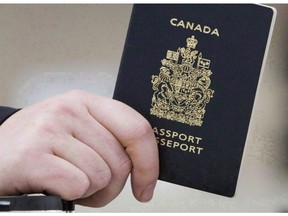‘A material component of the decision (to revoke his passports and not deal with him for five years) lacks intelligibility’

Article content
Canadian immigration officials were unreasonable to refuse services for five years to a Syrian-Canadian man they believed let his relative use his passport to enter Canada, according to a new Federal Court ruling out of Toronto.
Aiman Hatoum, a citizen of both Canada and Syria, took the Attorney General of Canada to court after the Passport Entitlement and Investigations Division (PEID) of Immigration, Refugees and Citizenship Canada revoked both his Canadian passports on Feb. 24, 2023. It also refused Hatoum passport services for five years starting Oct. 10, 2021, the date of the alleged misuse of the first passport.
Advertisement 2
Article content
“The applicant has established that a material component of the decision lacks intelligibility and is therefore unreasonable,” Justice Richard F. Southcott wrote in a recent decision.
The PEID found there were “reasonable grounds” to believe Hatoum let his relative use his Canadian passport to enter Canada, said the Federal Court decision, dated Jan. 31.
It “also found the applicant provided false or misleading information when applying for a second passport.”
Hatoun was issued a Canadian passport in November 2015.
He applied for a second passport in October 2021, at Canada’s embassy in Beirut, Lebanon, reporting the first one as stolen.
“My passport and other needed documents were in a small bag that was stolen from me while I was asleep,” Hatoum stated at the time. “I came from Syria to go to Beirut airport. I visited a rental place in Baisour in Lebanon on the way to relax before my flight to Canada as I was so early and so tired. I woke up to the (disappearance) of the host and my bag … I searched everywhere.”
Hatoum said he tried to “get hold” of his host, the Canadian embassy was closed, and that he sent it an email looking for guidance.
Article content
Advertisement 3
Article content
Recommended from Editorial
-

Canadian government begins invalidating passports of citizens who have left to join extremist groups
-

Canadians holding dual citizenship with countries targeted by immigration ban can still enter U.S.
Southcott noted that, in his declaration about the missing passport, Hatoum included the first name of his host at the place where it vanished, but did not identify him as a relative.
“The applicant states that he was unable to report the theft of the first passport until October 13, 2021, because the Beirut Embassy was closed on October 10 and 11, and on October 12, he was assigned an appointment at the Beirut Embassy for October 13.”
Hatoum was issued another passport at the Beirut Embassy on Oct. 25, 2021.
Officials with the PEID later learned that Lebanese authorities had detained Hatoum for “investigative purposes after receiving information that the relative had used the first passport to travel to Canada on Oct. 10, 2021, and that (Hatoum) used the second passport to enter Canada on Nov. 20, 2021.”
The relation who used Hatoum’s passport to enter Canada submitted a refugee claim here Nov. 23, 2021, “declaring (Hatoum) as his representative and relative and identifying his residential information and phone number to be the same as that of (Hatoum).”
Advertisement 4
Article content
When the PEID started investigating, Hatoum “asserted that the relative had stolen the first passport and used it to enter Canada without (his) knowledge. The relative has corroborated this assertion.”
Canadian officials found they had “reasonable grounds to believe (Hatoum) permitted the relative to use the first passport to enter Canada without authorization. The PEID also found (Hatoum) provided false or misleading information when applying for the second passport.”
That’s when they revoked both of Hatoum’s passports and refused to deal with him for five years.
In making that decision, the PEID noted that, “after reviewing the entry and exit stamps in both” passports, “there were discrepancies in the storyline of (Hatoum’s) travel history and the context relating to how and where (Hatoum’s first Canadian passport) was lost or stolen.”
It also pointed out that Hatoum didn’t report his passport stolen until his relative made it to Canada.
Hatoum argued “that the stamps in the passports do not demonstrate any discrepancies in his narrative as to his travels and the theft of the first passport. He suggests that the PEID confused stamps in the first passport related to his entry into and exit from Lebanon in October 2020 with other stamps related to such entry and exit in October 2021 … and therefore developed concern that the period of time the applicant was in Lebanon did not match his narrative.”
Advertisement 5
Article content
The PEID countered that there “is nothing in the record to indicate that (it) was mistakenly relying on the October 2020 stamps as (Hatoum) suggests.”
While the judge agreed with that, he pointed out his “difficulty with this component of the decision” to seize Hatoum’s passports and not deal with him for five years.
“The decision identifies neither the particular stamps to which it is referring nor the resulting discrepancies in the applicant’s narrative that were of concern,” Southcott said.
The judge said he had “difficulty interpreting the decision” when it came to the passport stamps.
“As (Hatoum) noted in reply to the (PEID’s) argument, it has never been disputed that he remained in Lebanon following October 10, 2021 (when the first passport disappeared) and that it was the relative who used the first passport to leave Lebanon and enter Canada on that date,” Southcott said.
“Therefore, it would not be intelligible to interpret the decision as identifying these facts as demonstrating a discrepancy in (Hatoum’s) narrative.”
The judge accepted the PEID’s logic that Hatoum failing to mention his passport was stolen by a relative showed he was not being truthful.
Advertisement 6
Article content
“However, it is not apparent from the decision that this logic forms part of the PEID’s reasoning,” Southcott said.
The judge found Hatoum’s “argument surrounding the passport stamps and resulting discrepancies in his narrative to be compelling, and the court cannot be certain that the PEID would have weighed the evidence in the same manner and arrived at the same findings, had it not determined based on the objective evidence of the entry and exit stamps that there were discrepancies in his narrative. As that determination is not intelligible, the PEID’s conclusions that there were reasonable grounds to believe that (Hatoum) had permitted the relative to use the first passport to unlawfully enter Canada and that (Hatoum) had provided false or misleading information leading to the issuance of the second passport, and the resulting decision to revoke the passports, are unreasonable.”
The PEID “in turn assigned significant weight to those conclusions in determining that that it was reasonable to impose a five-year refusal of passport services,” said the judge.
The PEID is authorized to do so “only where a passport has been refused or revoked,” Southcott said.
“As such, the refusal of services is also unreasonable, and the decision as a whole must be set aside.”
The judge sent Hatoum’s case back “to a differently constituted panel of the Passport Entitlement and Investigations Division … for redetermination.”
Our website is the place for the latest breaking news, exclusive scoops, longreads and provocative commentary. Please bookmark nationalpost.com and sign up for our daily newsletter, Posted, here.
Article content
#SyrianCanadian #relative #passport

















Leave a Reply